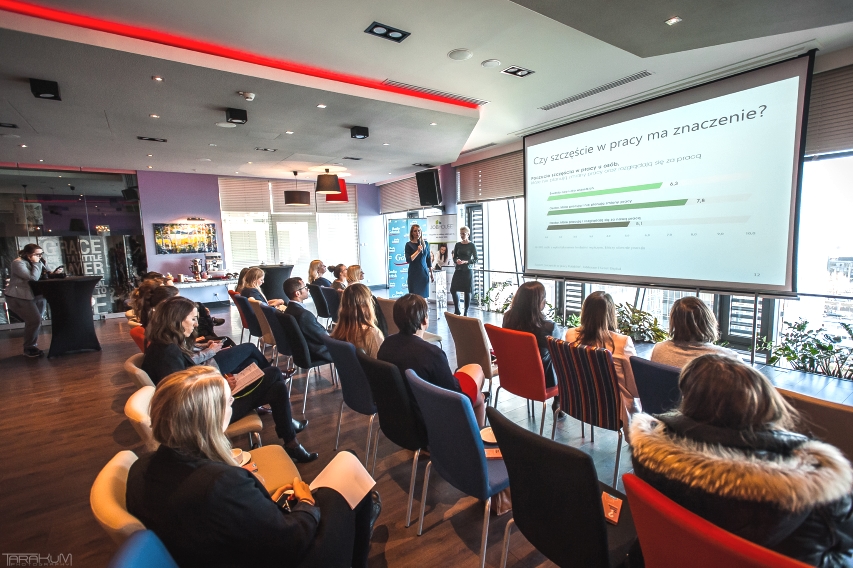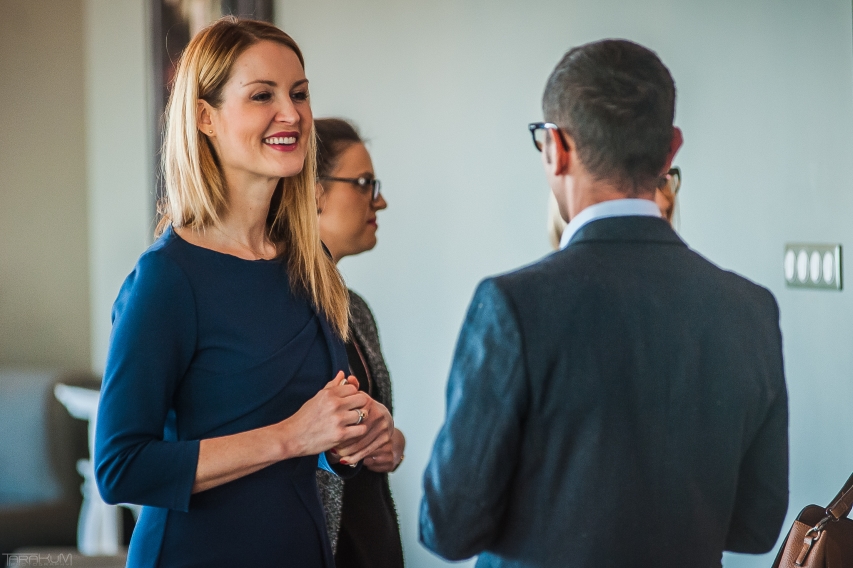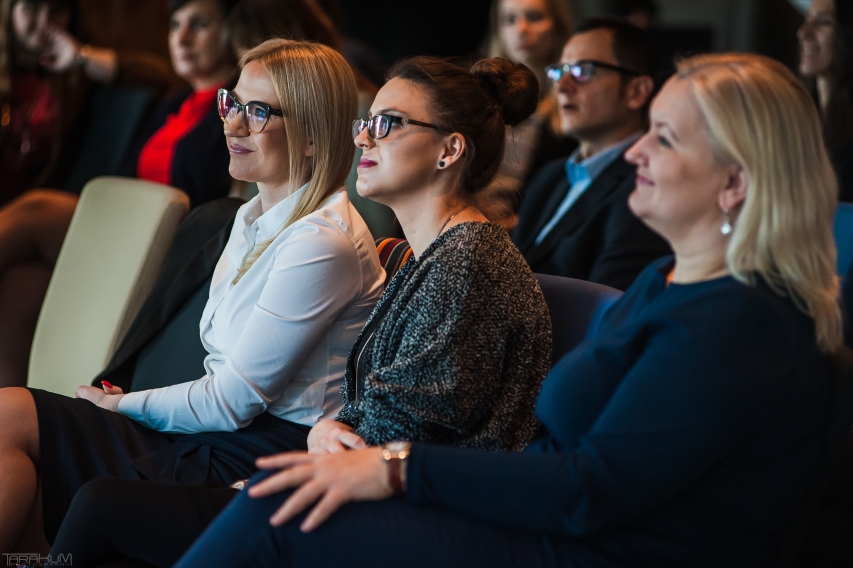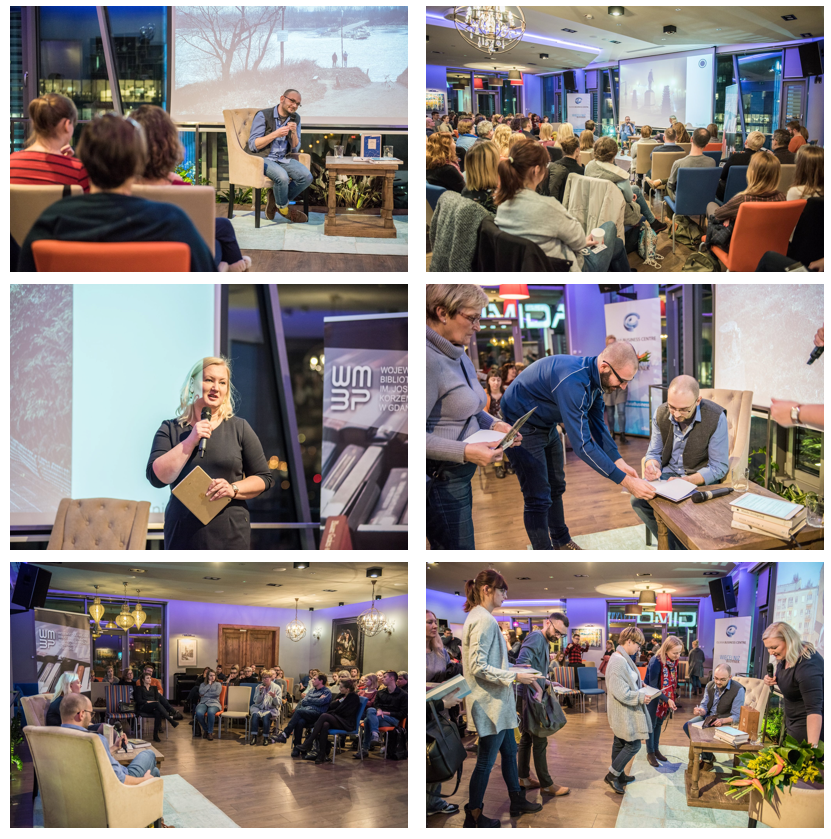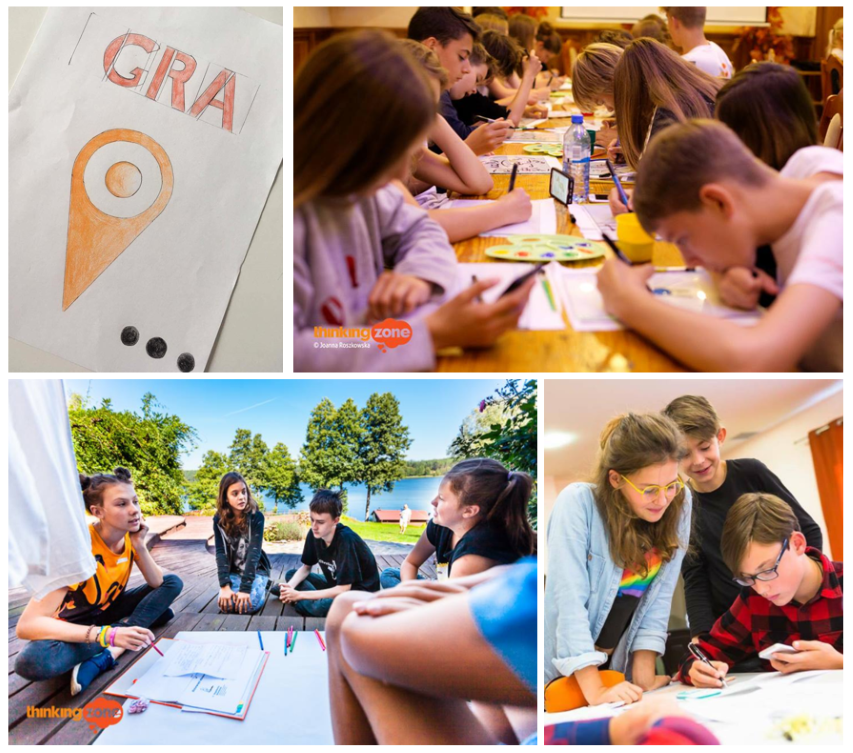Another event from the “Strategic HR” series will take place in Olivia on December 7. Main topics of the meeting: “Revolutionary changes in taxes and ZUS for employees and employers as of 2018. What to do to remain an attractive employer?” and “Crowdsourcing as a modern method of commitment of candidates and employees to online challenges related to the employer’s brand. How to win the fight for talents?”.
Presentations and workshops will be conducted by Eliza Skotnicka, the Senior Manager in the EY personal tax team, and Tomasz Socha, Associate Partner, Leader of the EY Tax Advisory Team in the Tri-City.
We invite you to take part in the meeting and to read an interview with Eliza Skotnicka from EY performed by Monika Bogdanowicz (Olivia Business Centre). The interview is another one prepared by us as a part of the “Olivia’s conversations” cycle presenting experts and quests of the Olivia Business Centre.
–/ —
Monika Bogdanowicz (Olivia Business Centre Communication): What will be the greatest changes in taxes and ZUS that await employees and employers as of 2018?
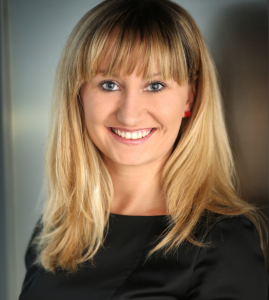 Eliza Skotnicka, Senior Manager, People Advisory Services, EY: One of the planned changes that is talked about most frequently and, at the same time, the most significant one for employers and employees is the lifting of constraints regarding the retirement and disability pension contributions. For employees earning more than 10 thousand gross per month, this change can entail the loss of one net salary and, for certain large firms, personnel costs will increase even by 20 million PLN yearly! As we are talking, it is not yet known whether the change will eventually come into force as of 2018. But, even if it does not, the legislator will most likely introduce it as of the following year.
Eliza Skotnicka, Senior Manager, People Advisory Services, EY: One of the planned changes that is talked about most frequently and, at the same time, the most significant one for employers and employees is the lifting of constraints regarding the retirement and disability pension contributions. For employees earning more than 10 thousand gross per month, this change can entail the loss of one net salary and, for certain large firms, personnel costs will increase even by 20 million PLN yearly! As we are talking, it is not yet known whether the change will eventually come into force as of 2018. But, even if it does not, the legislator will most likely introduce it as of the following year.
A beneficial change awaits creative employees offering activities such as research and development or one related to computer programs. They will be able to take advantage of the calculable 50% costs relating to a higher limit of revenues under their employment contracts and, as a consequence, earn even 26 thousand PLN more annually.
Long-term remuneration forms based on stocks of companies from countries with which Poland executed agreements on the avoidance of double taxation will also be preferred. So far, only stocks of companies from the European Union and the European Economic Area have been taxed according to preferable rates (19%). According to the new rules, also companies belonging, for example, to American or Swiss capital groups are able to suggest such a beneficial solution to their employees and members of management boards. One has to remember about the fulfilment of all official requirements of such a motivation program.
MB: How can we prepare for the imminent revolutionary changes in these areas?
ES: First of all, one has to be aware of them, calculate the expected increase in costs and the drop of net income. I recommend taking a look at types of positions and job descriptions existing in a company. It frequently turns out that an employment contract is not a form most suitable for the given nature of the work and duties.
1) Management board and proxies:
A management board member does not only work from 8 to 16 and his/her responsibilities go far beyond what the Labour Code provides for an employee. Therefore, he/she can be rewarded for such additional functions in a separate stream, on the basis of a corporate deed. In such a situation, the management board member’s remuneration is not covered with ZUS premium. One can also consider the introduction of a motivation scheme based on the award of stocks of a foreign company: the manager will only tax them when they are sold, according to the 19% PIT rate and with no ZUS.
2) Creative employees of IT and R&D departments:
Creative employees whose activities are related to computer programs or research and development can be rewarded for such activities by receiving a separate royalty fee under the employment contract. In that case, a half of that royalty will not be taxable because 50% of revenue acquisition costs can be deducted from the revenue. Even those firms where IT activities occurred and they have not identified or reported the creative activities of their employees should take an interest in such a solution. A CIT relief available in the case of the research and development activity (even up to 150% of qualified costs) can be an additional benefit for firms.
3) Experts:
More and more firms become flexible in their relations with the personnel. If experts work in a firm who advise independently creating effects of their work, i.e. acting in fact like entrepreneurs they can become contractors independent of the firm, conducting business, invoicing their contracting parties and deducting business-related costs for tax purposes. In such a situation, their income can be taxable with the flat rate (for that to be possible, they cannot render the same services as a part of their business during a year as for their previous employer and their services cannot be related to the management) and they can take advantage of preferential ZUS premiums.
4) Aliens:
If they are not tax residents in Poland they can be remunerated pursuant to the same relations the income from which is taxable with the 20% lump-sum rate in Poland. Additionally, it is worthwhile to analyse whether they can pay premiums in another country (e.g. in their home country) instead of in Poland. Such a solution can turn out to be cheaper.
MB: Will it be possible to generate further savings in a firm by revising costs of ZUS and PFRON premiums paid by the employer?
ES: An interesting thing is that our extensive experience shows that many firms approach certain cost areas in their firms too prudently or even improperly and needlessly overpay public levies. What I have in mind is, in particular, the area of social security premiums of the employer (especially the accident premium and the labour fund premium) and PFRON but also ZUS premiums on employee benefits. They are usually very high cost positions in firms, especially in firms based mostly on the people such as shared services centres. An audit of systems and of the delivery and exchange of the information of key importance for the value of such burdens is worth carrying out in the firm from time to time; an undiscovered great potential for savings is often hidden there. EY offers such a review on the no-cost basis – only if the identified savings materialize we shall share the fruit of the common success.
MB: What action can we take in our firms, what can we do to remain attractive employers?
ES: First of all, it is worthwhile to fight to retain net remuneration levels for employees in firms and, where possible and a where a business need exists, to reflect the reality properly by applying preferences provided for by the legislator in order to respond to the planned changes.
Secondly, the atmosphere in the firm is more and more often mentioned in the context of the employer’s attractiveness. New generations enter the labour market: the millennials and the Z generation representatives. Such young people expect the employer to be understanding, to listen and commit to interesting projects and to support the development of their talents. However, they also want to pursue their passions, dreams, get fulfilled as parents and in other roles related to social commitments, they want to influence the reality. The concepts such as the “digitalization strategy” are artificial for them; they were simply raised and continue to live in a digital world. They surely are a great challenge for managers who entered the labour market at a different moment and quick promotion was their top priority.
Modern employers have to take care of the relationship with students, future candidates, have an interesting communication addressed to them and invite them to the world of their brands.
MB: Why do you recommend crowdsourcing as a modern way of committing candidates and employees on a digital platform? What does it mean for firms when it comes to activities in the employer branding area?
ES: Because it is an answer to such challenges. According to the studies, at least 75% of the most dynamically developing enterprises will use the crowdsourcing during the next 2 years. It is something distinguishing but also natural and effective on the market.
Crowdsourcing is a process of the outsourcing of tasks beyond the organization, to communities specially built and committed to that purpose. Irrespectively of how well our organization prospers, the majority of wise and creative people are beyond that organization. Crowdsourcing makes it possible to take advantage of that “wisdom of the crowd”. Such huge and globally recognizable brands as Facebook or YouTube (the largest media platforms mainly based on foreign contents), Uber (a successful taxi firm without its own fleet) or Airbnb (one of the largest property lease platforms without its own real estate) are nothing else but examples of the crowdsourcing application. Wikipedia also owes its up-to-date nature to the crowdsourcing.
Crowdsourcing helps achieve the intended effects thanks to the use of IT tools, i.e. commitment platforms and a system of motivators specially designed for the target group. All of them are supplemented with the appropriate and, an even more important thing, properly frequent communication.
Innovators on the MillionYou platform is a new EY Crowdsourcing project. Thanks to that project, students can participate in interesting tasks, cope with real life, professional or business challenges. Business needs meet the creativity of young people who can get references, win prizes and pursue their passions on the platform. Lecturers from business schools, universities and universities of technology as well as aliens are committed to the operation of the platform (the platform is bilingual, available in English as well). It is the first such initiative in Poland.
Employer branding of the 21st century is the one that commits potential candidates in the long term by interesting rather than mercenary actions, including the employer’s brands in their lives and being interested in their lives, i.e. starting a dialogue with them long before they become addresses of job offers. Therefore, when making a decision regarding the choice of their future employer, they will be aware, familiar and perhaps will even know their future employer very well because they took part in its life during the studies. Crowdsourcing is a tool of that dialogue. In addition to the dialogue and commitment and a certain loyalty, it also allows one to reach a great range and effectively reach recipients of the message where they are, in particular, via the social media, Instagram, YouTube and students’ organizations.
MB: Where is this method applied?
ES: Application possibilities are practically unlimited. Let us take the open innovation concept for example: global concerns apply it, in particular, to gain the competitive edge by inviting large groups of scientists and students to submit innovative ideas regarding new solutions and products.
In Poland, crowdsourcing is most frequently used in the communication with inhabitants of cities, as a social participation tool for the gathering of ideas in the smart city building concept;
in the brand communication as an alternative or a supplement to ideas regarding the promotion of products or services created in creative agencies. Large groups of independent authors who are often consumers of the product are engaged for such projects. All of it takes place in order for them to say how they want the brand to communicate with them, how it should advertise its products. The objective is to create the communication with which recipients can identify (branded content creation).
MB: What does it offer?
ES: We do not fall way off the mark because a group of committed people, similar to those we want to reach, executes the task. It is no longer a one-way communication but rather the inclusion of a customer, consumer or inhabitant in the process of searching for reasons and the drawing of conclusions. A bilateral relationship, dialogue and trust are built in this manner.
Measurable effects consist of a multitude of fresh, authentic ideas offered in an engaging manner that can be used, for example, to supply the social media. Consumers do not usually like someone to sell something to them. However, they like someone to tell them an interesting story. Crowdsourcing makes it possible for people to talk to people as opposed to the typical approach to the promotion of brands when a brand or a product tries to communicate with them.
Experts in the topic say that there is no future for firms that do not use such tools.
MB: What is of key importance in employer branding activities? A lot of firms boast about having such strategies.
ES: It is true. It is fashionable these days. However, are there any actions and the use of specific tools following such strategies or are they only documents containing many pages, hinting at individual actions already taken by everyone?
I absolutely do not believe that traditional actions such as strategic games, ambassadors at universities or presence at fairs are no longer useful. I do not say that such individual actions are ineffective. However, I believe they are no longer enough to gain competitive edge on the employee’s market. In this context, it is worthwhile to cite an English title of a book by a marketing guru Jack Trout: Differentiate or Die.
The employer’s brand can and has to be built similarly to a brand of a product, i.e. by using an appropriate communication and having a long-term strategy. Brand recognisability or reach and an authentic message consistent with the DNA of the organization makes it possible to attract the best candidates. However, when I talk about the best candidates, I do not mean top students only. I am talking about those candidates whose values, interests and aspirations will correspond to what the future employer demands and who will find their place in a new workplace and become its ambassadors as well.
MB: And is it also possible to use that method with regard to existing employees?
ES: Of course. I often hear employees saying that their voice is not respected by the employer. The truth is that perhaps the managers would like to hear something but they do not know how to start listening effectively. And what is the effect? Posters advertising “submit an idea and get a prize” programs are ignored, idea boxes remain empty and employees do not ask any questions at the annual communication meetings. Employee satisfaction studies show deteriorating results and nobody knows how it is possible.
MB: What can be done in such a situation? The employees got an opportunity to make comments but do not take advantage of it.
ES: One can feel offended. But being offended will not help. The truth is that just giving people a voice will not solve anything. Gaining the commitment, making people willing to talk without huge financial expenses or time spent for such processes are essential. The business has to go forward. However, you need commitment and communication experts for that. The time of employee questionnaires has already passed.
MB: What motivators encouraging the commitment will be most effective?
ES: A different stimulus may work for each person. The most important thing is to learn about the key incentives that make it possible to acquire the commitment and the voice of representative groups. And it is no longer about financial incentives.
MB: In what areas can the voice be given to employees? How do successful firms do it?
ES: Internal platforms supporting the innovativeness are worth using. Why? It often happens that employees that are closest to the customer (e.g. cashiers or production line workers) have superb improvement ideas: for a product, production process or a customer service method – but they have no one to report them to. Because their immediate superior can fail to appreciate such creativity for various reasons or can simply have no idea what to do with such an idea.
Crowdsourcing encourages discussion within the firm, the inclusion of colleagues in the process and the reporting of ideas. However, not everyone has ideas, some people are better in criticizing. And this fact is also appreciated and rewarded because it can result and often results in an improvement of ideas. It is very important to select the best ideas and to implement them.
However, this task has to be entrusted to experts in the subject area with measurable success in the effective commitment of employees. Otherwise, we are likely to get another dead process in the firm which nobody will be able to boast about.
MB: It sounds encouraging. It is enough to define measurable goals for appropriate people and they are sure to be realized?
ES: The entire process, i.e. idea management can only be successful if incentives, the communication, the IT platform and all stages of the process are properly planned, implemented and synchronized and if the message is appropriate also from the marketing perspective. The understanding of the organization’s DNA and its employees, of what the employer would like to achieve, what effects similar actions had in the past etc. has to precede the entire process. Planning a pilot project is worthwhile. It is the job for experts in community commitment. Only then, it is possible to try and define financial goals for appropriate people in the organization as regards the generation of additional revenues as a result of internal innovativeness processes.
MB: Are there any other potential application areas important for HR?
ES: Yes, it is not a closed catalogue. However, crowdsourcing will also be useful in activities related to the corporate social responsibility (CSR). It is also indispensable for those firms that plan a replacement of office space with more modern and also adapted to the needs and working style of their existing employees and next generations. Their engagement in the collection of ideas will make it possible for them to become true ambassadors and beneficiaries of change. It will also be useful in those enterprises that strive for the offered non-wage benefits of corporate events to correspond to the needs and requirements of individual employee groups. They want these benefits to be satisfactory rather than a dead and complicated catalogue of failed “attractions”.
Crowdsourcing is also worth using for internal communication (with employees) or external communication (with candidates) to create attractive photographic or video contents in those firms that have no interesting ideas for them and their creation with the help of specialist firms is too expensive for them.
MB: Quite a lot has been said recently about the introduction of the obligation to maintain employee capital schemes in firms. Is this idea still valid?
ES: The legislator motivated by the deteriorating demographic situation and the willingness to guarantee funds for us once we retire is preparing a new requirement for employees: Employee Capital Schemes (PPK). The work on the final regulations is in progress and their entry into force is not determined. The key issue is for employers to start getting prepared and consider their options now. Because it can be too late for action later. For example, because the intense interest of all firms at the same time will exhaust the capacities of specialist firms supplying such solutions and raise prices.
MB: What can be done now, specifically?
ES: The planned regulations provided that the PPK requirement would not cover those firms that already had the Employee Retirement Scheme (PPE). It can turn out that PPK is a more attractive option to be considered though. However, a few months are needed in order to implement the solution in the firm.
MB: And what about changes in the data security area – RODO? What should everyone know about that law and what new requirements does it impose on the employers?
ES: It is the most extensive change of regulations relating to personal data in 21 years! It will come into force as of May 25, 2018; the transitory period has to be used in order to analyse and prepare for the imminent challenges. In the HR area, key changes are related to the employer’s obligations related to data security, both in recruitment processes and in the creation, storage and processing of employee data.
The scale of changes will materially influence a range of areas related to data processing in the organization, both as regards the law and IT systems. Additionally, the reform introduces severe monetary penalties to be imposed on data administrators. Penalties can even amount to 20 million EUR or 4% of the total annual global turnover of the enterprise generated in the preceding financial year.
We recommend our customers to take action in order to reduce the risk to the reputation and the risk of delays in the implementation of solutions resulting from the Regulation and imposition of penalties for the incorrect processing on the entity processing personal data.
MB: What benefits can employers gain thanks to the employment of foreigners and trainees?
ES: Foreigners constitute a valuable resource of job candidates and qualified specialists, especially as deficits of certain skills can be observed on the Polish market. We have been observing a growing trend in this area for some time.
When deciding to employ foreigners, one surely has to remember to address important issues such as compliance with applicable regulations of the migration law, support in tax and ZUS settlements (an experienced firm being a part of a global network of tax and immigration advisors will help with this task). It is also worthwhile to guarantee an appropriate catalogue of the required information to them and care about the integration in a new country and in new circumstances.
In turn, trainees help firms find potential candidates and future employees on rotating positions. Properly structured training programs also offer an opportunity for a closer cooperation between the business and schools and universities and for the influence on the appropriate matching and modernization of curriculums so that they respond to the market and business needs.
MB: Thank you for the interview.
–/–
Eliza Skotnicka, Senior Manager in the EY personal tax team. While working in the EY central office in Warsaw, she has been supporting corporations and firms from the SME sector in the area of effective remuneration structures, taxation of internationally mobile persons and modern employer branding activities with the use of the social media and a digital platform for 10 years.
–/–
ABOUT EY
EY Poland (www.ey.com/pl/) is an international consulting firm specializing in business, tax and legal consulting as well as in auditing and transactional services. EY also offers strategic HR consulting. Corporate experts help create the effective HR strategy, remuneration and incentive schemes for employees as well as design activities related to employer branding (www.ey.com/pl/pas). EY Poland has offices in the largest Polish cities (Warsaw, Cracow, Poznań, Wrocław, Katowice, Gdańsk, Łódź).
CONTACT


 Zapraszamy na świąteczną odsłonę cyklu koncertowego
Zapraszamy na świąteczną odsłonę cyklu koncertowego 
 Świąteczny Kiermasz Charytatywny
Świąteczny Kiermasz Charytatywny Serdecznie zapraszamy do udziału w corocznej
Serdecznie zapraszamy do udziału w corocznej 
 Konkurs na najzabawniejszy sweterek świąteczny. Serdecznie zapraszamy do wzięcia udziału w naszym sweterkowym konkursie! Wyciągnij z dna szafy swój ulubiony świąteczny sweterek, załóż go, przyjdź w nim do pracy:), zrób zdjęcie, wyślij do nas na adres
Konkurs na najzabawniejszy sweterek świąteczny. Serdecznie zapraszamy do wzięcia udziału w naszym sweterkowym konkursie! Wyciągnij z dna szafy swój ulubiony świąteczny sweterek, załóż go, przyjdź w nim do pracy:), zrób zdjęcie, wyślij do nas na adres  Kulinarny konkurs charytatywny: Zostań mistrzem świątecznych przysmaków.
Kulinarny konkurs charytatywny: Zostań mistrzem świątecznych przysmaków. 

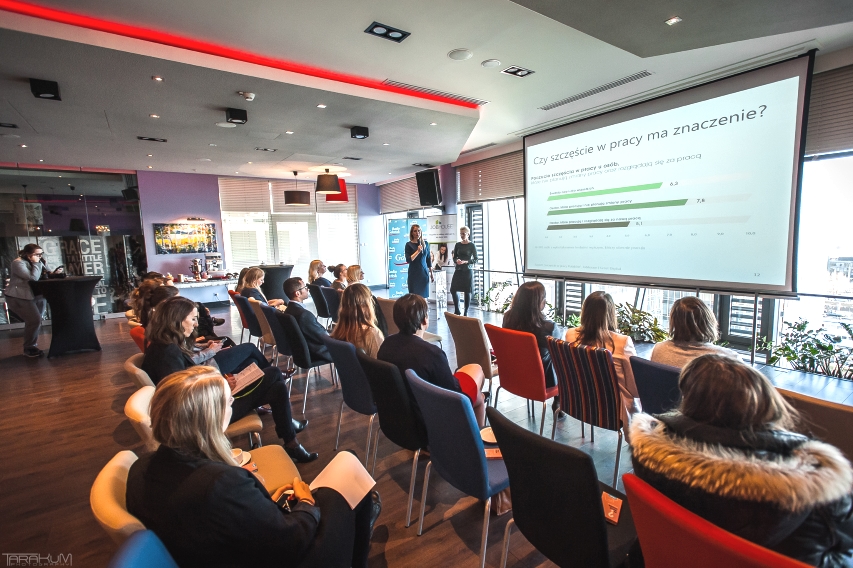
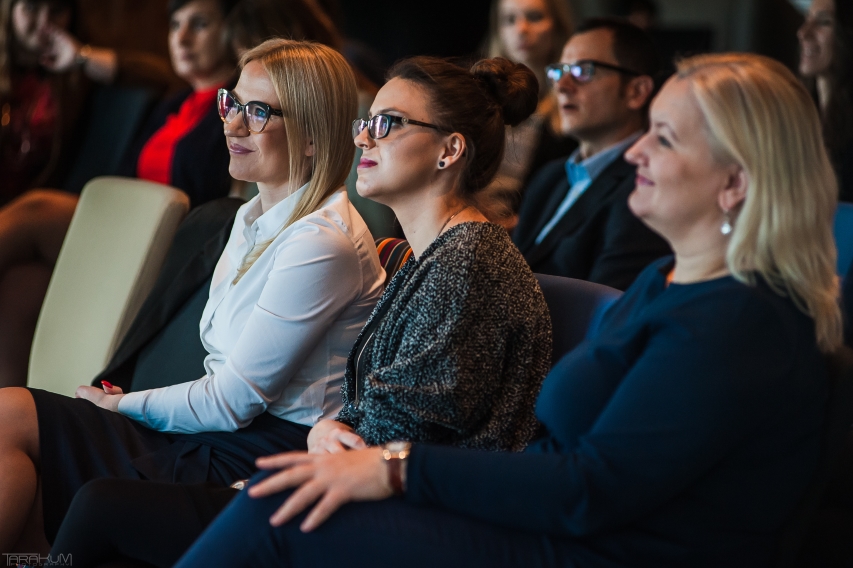
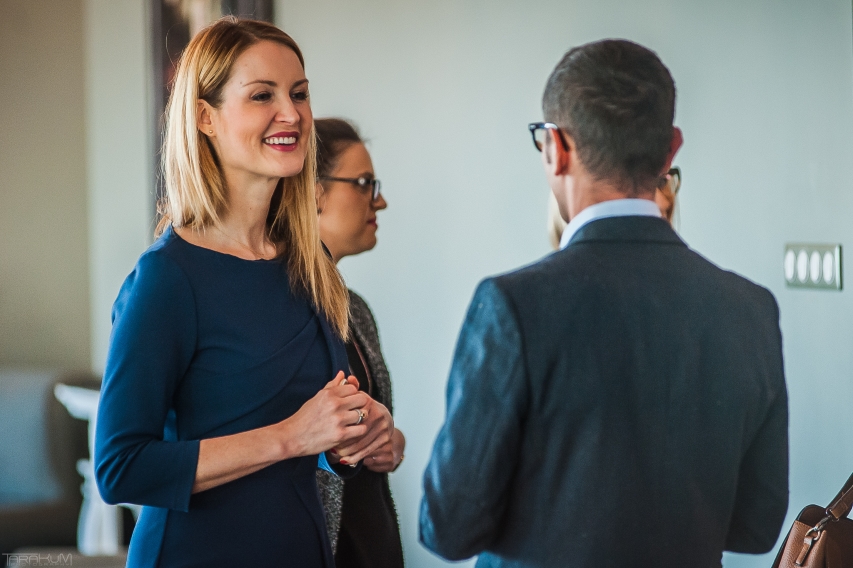
 Saturday, December 2 at 6:00 pm
Saturday, December 2 at 6:00 pm

 Saturday, December 9 from 11:00 am to 2:00 pm
Saturday, December 9 from 11:00 am to 2:00 pm
 Competition for the funniest Christmas jumper. We would like to invite you to participate in our jumper competition! Pull your favourite Christmas jumper out of the bottom of your wardrobe, put in on, come to work dressed like that :), take a photo, send it to us or publish on Facebook and win a surprise gift! The person, who will have the biggest number of votes under their photo, will be a winner. Let’s go :)!
Competition for the funniest Christmas jumper. We would like to invite you to participate in our jumper competition! Pull your favourite Christmas jumper out of the bottom of your wardrobe, put in on, come to work dressed like that :), take a photo, send it to us or publish on Facebook and win a surprise gift! The person, who will have the biggest number of votes under their photo, will be a winner. Let’s go :)!
 Christmas offers
Christmas offers
